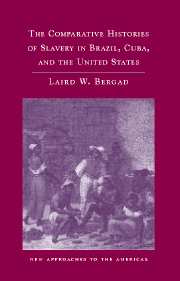Book contents
- Frontmatter
- Contents
- List of Maps and Figures
- Introduction
- 1 From Colonization to Abolition: Patterns of Historical Development in Brazil, Cuba, and the United States
- 2 The Diversity of Slavery in the Americas to 1790
- 3 Slaves in Their Own Words
- 4 Slave Populations
- 5 Economic Aspects
- 6 Making Space
- 7 Resistance and Rebellions
- 8 Abolition
- Bibliography
- Index
- Plate section
Introduction
Published online by Cambridge University Press: 05 June 2012
- Frontmatter
- Contents
- List of Maps and Figures
- Introduction
- 1 From Colonization to Abolition: Patterns of Historical Development in Brazil, Cuba, and the United States
- 2 The Diversity of Slavery in the Americas to 1790
- 3 Slaves in Their Own Words
- 4 Slave Populations
- 5 Economic Aspects
- 6 Making Space
- 7 Resistance and Rebellions
- 8 Abolition
- Bibliography
- Index
- Plate section
Summary
The African slave trade and slavery were among the great human tragedies in the development of the Americas. There were few colonies or nations founded by European powers where slaves of African descent were not found in significant numbers at some point in their histories. The institution of slavery and forced labor in one form or another was a part of all cultures – African, Asian, European, and in the indigenous societies of the Americas prior to European colonization. But it was only in the Americas that slavery developed as an institution based upon race. Although indigenous peoples were first enslaved by Spanish and Portuguese conquerors during the prolonged processes of discovery, conquest, and colonization initiated by the Columbus voyages of the late fifteenth century, by the 1550s only those of African descent could be enslaved according to legal codes. Scholars have debated why race-based slavery developed in the Americas on such a pervasive scale after 1500. They have arrived at the generalized conclusion that the European colonial powers became reluctant to enslave peoples who were racially similar to themselves, even though this had been the case for centuries within nearly all European cultures. Africans were so unlike Europeans from racial, religious, and cultural perspectives that it became morally and politically acceptable to enslave them. All kinds of philosophical and religious reasons were constructed by Europeans to justify the exclusive enslavement of peoples of African descent.
- Type
- Chapter
- Information
- Publisher: Cambridge University PressPrint publication year: 2007



